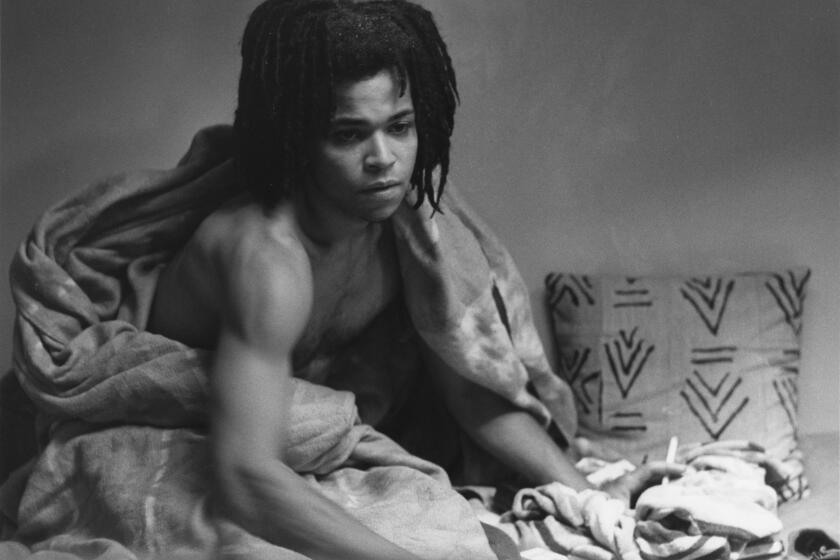March on Washington Film Festival: Highlighting unsung civil rights heroes
Not all heroes of the civil rights movement became household names. Consider Harry T. Moore.
On Christmas night in 1951, a bomb ripped through Moore’s house, killing him and his wife. Moore, the president of the NAACP in Florida, was helping defend three young black people accused of raping a white woman. No one was ever indicted in Moore’s death, and though the incident is considered by some as the start of the civil rights movement, his name doesn’t carry the same recognition today as leading movement figures such as Martin Luther King Jr. and Rosa Parks.
“Moore’s name is kind of forgotten as a martyr of the civil rights movement,” Pulitzer Prize-winning author Gilbert King told a packed house at the third annual March on Washington Film Festival.
The 10-day festival began Wednesday with a discussion of women of the civil rights era and a screening of the short “This Little Light of Mine: The Legacy of Fannie Lou Hamer,” about the cotton field sharecropper who endured death threats and a brutal jail beating as a leader in the fight for the black vote in Mississippi.
One goal of the festival, founded by Robert Raben, is to commemorate people such as Hamer and Moore, to celebrate those who marched behind the leaders of the civil rights movement. It is also designed to help forge a new generation of civil rights activists who can seize on the social unrest that has dotted the country in recent months and press for progress in a national movement.
The films are the lure to help start conversations and to provide detailed accounts of the movement with the goal of renewing activism among young people more effectively than if “Martin Luther King, Rosa Parks and the leadership are sold to us like perfect, untouchable, saint-like heroes,” said Marcela Salazar of the public policy advocacy firm the Raben Group.
It’s Raben’s hope that audience members realize “they have the capacity for this type of change.”
“The battle for civil rights is not over, as you can see from the tragedies we have seen this year and controversy with the Confederate flag,” Salazar added.
An event Thursday night featured a panel discussion that emphasized that American children must be taught about the now-forgotten people who made the civil rights movement possible. A brief interlude by Howard University’s Afro Blue jazz ensemble balanced the serious discussion with an uplifting a cappella performance.
“We’ve had an awful lot of wake-up moments, but I don’t think we’ve had a breakthrough,” said Pulitzer Prize-winning author Taylor Branch. “The country is still very adept at shaking off what happens and saying, ‘Let’s forget about it.’”
“I’m hoping that we’re building towards a breakthrough and that people realize it’s up to me to do that,” Branch said. “It’s important to relate the past to the present.”
For Yvonne Hawkins, a young woman who belongs to the social justice ministry at her Baptist church in Alexandria, Va., outside Washington, “it was phenomenal to hear insiders’ grand anecdotes of people in the [civil rights] movement and bring it forward to today.”
On the festival’s opening night, civil rights pioneer Julian Bond spent time with many in the crowd. That same evening, the Rev. Ed King, another civil rights hero, commented on how he admired young people today for organizing via technology instead of waiting for someone else to solve their problems.
“I’m just overjoyed to see so many young people, particularly in the last year, taking to the streets, showing for the first time in several generations how much they care about fundamental humanity,” said Riley Temple, a board member at the National Archives, which partnered with the festival to present Thursday’s event.
Last year, Raben expanded the festival to New York City and Georgia. This year, he focused on drawing an audience to a single festival in Washington, where every event has been sold out.
He plans to expand to Los Angeles, adding a Latino component, though he didn’t say when.
Newly released films being screened at the festival included “Black Panthers: Vanguard of the Revolution” and “The Trials of Constance Baker Motley.” Older films from the 1960s, such as “I Am Somebody,” are also being shown.
On Tuesday evening, the festival will be dedicated to South Carolina and the civil rights movement, an event planned before the massacre at a black church in Charleston last month, because “the state’s history in the civil rights era is often overlooked and has long been a battleground.”
The festival ends next Saturday with an event at the Supreme Court, often the final arbiter on civil rights issues.
Twitter: @tomanmiller
Only good movies
Get the Indie Focus newsletter, Mark Olsen's weekly guide to the world of cinema.
You may occasionally receive promotional content from the Los Angeles Times.







